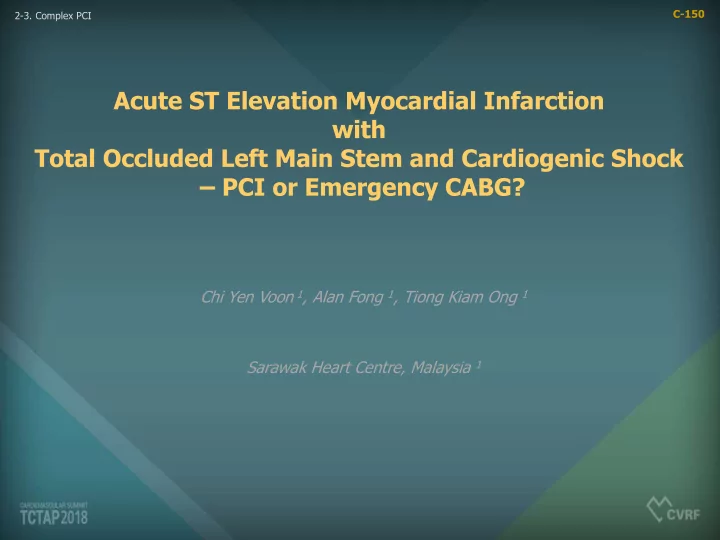

C-150 2-3. Complex PCI Chi Yen Voon 1 , Alan Fong 1 , Tiong Kiam Ong 1 Sarawak Heart Centre, Malaysia 1
Clinical History • Mr. DJ, 57 year-old, active smoker. No other medical illness. • At 22:40, he presented to non-PCI capable hospital for chest pain for past 3 hours. • At ED, BP 66/52, bibasal lungs crepitation, SPO 2 92% on high flow mask. • ECG – ST elevation at lead I, AVL, V2-V6 with ST depression at inferior leads.
Progression in ED • Intubated and supported with inotropes • Arterial blood gas showed severe metabolic acidosis • Referred to our centre for primary PCI • Diagnosis – anterior STEMI Khilip 4 with cardiogenic shock
PT2MS guide wire into LCX After multiple aspiration
Re-crossed GW into LAD
POBA to LM-LAD After thrombus aspiration in LAD (door to balloon time 75 mins)
Progress after POBA • After POBA, IABP was inserted • IV Glycoprotein IIb-IIIa inhibitor infusion at 25 mcg/kg was started • Referred to surgeon (on table) for emergency CABG • Echo showed severe global hypokinesia with EF < 25%
• However, surgery was not done in time • Deteriorated nearly 24 hours after admission • Deteriorating renal function eGFR 23ml/min/1.73m 2 • Rescue PCI was decided after discussion with surgeon • Proceed with PCI at 22:00 (24 hours after admission)
POBA to LM-LAD with 3.0 x 15 mm NC BMW GWs into LAD & LCX balloon to 22 atm
3.5 x 18 mm DES at 14 atm
Re-crossed GW into LCX 3.75 x 10 mm NC balloon at 12 atm
Final kissing with 3.75 x 10 mm and 2.0 x 10 mm NC balloon
Progress of patient Remained intubated and passed away 34 days after admission due to pneumonia and sepsis
Conclusion • Although initial POBA aimed to establish good TIMI flow in LAD and LCX was achieved within 5 hours after the onset of chest pain, but complete revascularization was delayed • This led to delayed myocardial recovery, leading to prolonged intubation and cardiac rehabilitation, which inevitably invited unnecessary complications such as hospital acquired and ventilator related pneumonia
• Repeated echocardiography after PCI did not show dramatic improvement in LVEF which implied the importance of early revascularization in patient presented with occluded LM and cardiogenic shock
Time is muscle is survival Thank you
Recommend
More recommend